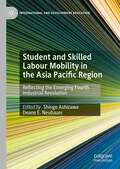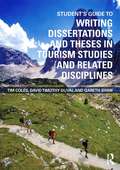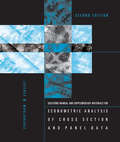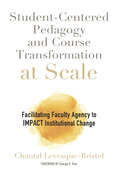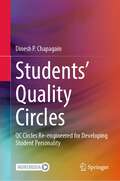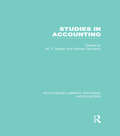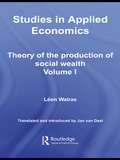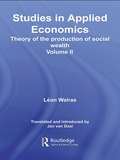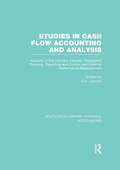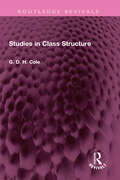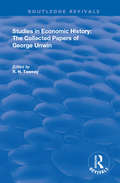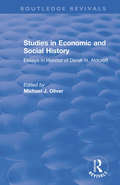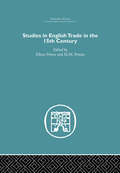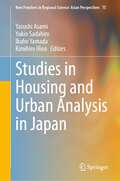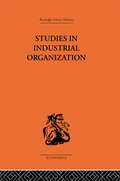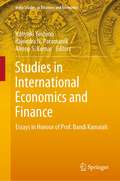- Table View
- List View
Student Workbook: Your Route to Success
by John A. Wanat E. Weston Pfeiffer Richard Van GulikDesigned to help students review content, apply knowledge, and develop critical-thinking skills. A wide variety of activities are provided for various learning styles. This supplement is a consumable resource, designed with perforated pages so that a given chapter can be removed and turned in for grading or checking. This Student Workbook is designed for use with the text Learning for Earning: Your Route to Success
Student and Skilled Labour Mobility in the Asia Pacific Region: Reflecting the Emerging Fourth Industrial Revolution (International and Development Education)
by Deane E. Neubauer Shingo AshizawaThis volume explores the implications of student mobility on higher education across the Asia Pacific Region. Student Mobility has become a major feature of higher education throughout the world, and most particularly over the past two decades within the Asia Pacific Region. This system of mobility is entering a period of profound predicted change, created by the social and economic transformations being occasioned by the rapid increased uses of artificial intelligence (AI), a process that is being increasingly framed as the “Fourth Industrial Revolution” or Work 4.0, a process that is widely predicted to evoke fundamental changes in the ways that work is performed and who does it. This volume explores various dimensions of this process, examining various aspects of the process as they are affecting national and regional economies even as the phenomenon produces a wide variety of engagements with the global economy as a whole.
Student's Guide to Writing Dissertations and Theses in Tourism Studies and Related Disciplines
by David Timothy Duval Gareth Shaw Tim ColesAround the world every year very many students have to complete dissertations or theses as part of their undergraduate or masters studies in tourism and related subjects. Often this substantial piece of self-directed work is the culmination of their programmes. More than just a means to consolidate their final grades, it is also an exciting chance to research a topic of their choosing and a potential gateway to more advanced study as well as job offers and future career paths. Yet for all these reasons, many students view the dissertation as a tricky challenge. This comprehensive book intends to take the stress and anxiety out of doing a dissertation in tourism studies and related disciplines. The process is examined from the germination of an idea to the submission and assessment of the final document. Written primarily for students conducting independent research for the first time, this book offers simple advice and a clear framework which students can adopt even in more advanced studies at masters and doctoral level. This book debunks popular myths, and aims to overcome common pitfalls. It focuses on the aims and objectives as the DNA of every dissertation. Rather than view it as a single, overwhelming project, the dissertation is presented as a series of more modest, manageable yet crucially inter-linked tasks that all students can successfully complete through careful preparation and effective time management. Dissertations are not to be underestimated and they demand great care and attention, but they can also be immensely rewarding and enriching experiences academically and personally. This ‘jargon free’ book is also written with overseas students specifically in mind, drawing directly on our overseas students’ experiences. This valuable resource contains start of chapter learning objectives and end of chapter checklists, as well as numerous boxed case studies, to further help assist students through their dissertation.
Student's Solutions Manual and Supplementary Materials for Econometric Analysis of Cross Section and Panel Data, second edition (The\mit Press Ser.)
by Jeffrey M. WooldridgeThis is the essential companion to the second edition of Jeffrey Wooldridge's widely used graduate econometrics text. The text provides an intuitive but rigorous treatment of two state-of-the-art methods used in contemporary microeconomic research. The numerous end-of-chapter exercises are an important component of the book, encouraging the student to use and extend the analytic methods presented in the book. This manual contains advice for answering selected problems, new examples, and supplementary materials designed by the author, which work together to enhance the benefits of the text. Users of the textbook will find the manual a necessary adjunct to the book.
Student-Centered Pedagogy and Course Transformation at Scale: Facilitating Faculty Agency to IMPACT Institutional Change
by Chantal Levesque-BristolIn response to national concerns a decade ago, driven by research that showed that higher education was making little impact on students’ development of broad competencies and critical thinking, the provost and president of Purdue University, a research university, instituted a program whose goals were to build on the accumulated knowledge on effective teaching to facilitate student learning, improve outcomes, and change the institutional culture around teaching and learning – objectives to which many institutions aspire, but which few consistently attain, or attain at scale.This book describes the development of Purdue’s IMPACT program (Instruction Matters: Purdue Academic Course Transformation), from its tentative beginning, when it struggled to recruit 35 faculty fellows, to the present, when 350 have been enrolled and the university has more applications than it can currently handle. Overall, more than 600 courses have been impacted, many of which have seen significantly reduced DFW rates. Chantal Levesque-Bristol, whose Center for Instructional Excellence is part of an institutional team that comprises the Provost’s Office, Teaching and Learning Technologies Unit, Institutional Assessment, the Purdue University Library and School of Information Studies, and the Evaluation and Learning Research Center, describes the evolution of IMPACT, lessons learned, and the central tenets that have led to its success. The purpose of this book is notonly to describe the program, but also to highlight the importance and implications of the underlying motivational theoretical framework guiding the initiative. Having started as a course redesign program that faltered in achieving its objectives, the breakthrough came with the introduction of the fundamental motivational principles of self determination theory (SDT) followed by the applications of these principles to the research in higher education leadership and pedagogy. Giving faculty fellows the autonomy to build on their disciplinary expertise, pursue their interests and predilections, within a guided framework, and leveraging interactions with colleagues through FLCs, stimulated faculty fellows’ motivation and creativity.This book describes the core and structure of the IMPACT program, presents details of faculty learning curriculum, explains how the focus on SDT principles shaped the program’s evolution and transformation from a course redesign to a professional faculty development program, and covers the considerations behind the formation of faculty fellow IMPACT teams A concluding chapter addresses how the IMPACT program, having helped faculty pivot to emergency remote teaching when the campus closed owing to the COVID-19 pandemic, is being modified so it can be successfully sustained online if circumstances require, or as a means to expand its reach in the future.While the principles behind this initiative will be of compelling interest to its primary audience of faculty developers, several chapters will have appeal to instructors and administrators.
Students’ Quality Circles: QC Circles Re-engineered for Developing Student Personality
by Dinesh P. ChapagainThis book explains what Students' Quality Circles (SQC) are, how they function, key constraints and issues in implementation, and possible solutions to make it a valuable co-curricular activity. It showcases how Quality Control Circle (QCC) is reengineered with the sole purpose of prosocial personality development of students at their early age. It is a research outcome which depicts the direction of the education system toward character building rather than only developing knowledge and skills. The logical sequence of presentation of the book is ‘why,’ ‘what,’ and toward the end, ‘how’ SQC in education. The book satisfies four hierarchical levels of readers. The first level is of educationists and national policy makers who may take up SQC as an important approach of the education system in their country for prosocial personality development of students and thereby targeting to produce quality citizens in the future. At the second level are chief executives or managers of educational institutes who may identify the potential of SQC approach for developing the positive personality of their students. Teachers and SQC facilitators are at the third level, and they can use the book to train and educate their students while initiating and promoting SQC activities at their institutes. And finally, at the fourth level obviously are students who may refer to this book from time to time and practice SQC on their own for self-development and empowerment.
Studien- und Abschlussarbeiten schreiben: Seminar-, Bachelor- und Masterarbeiten in den Wirtschaftswissenschaften (Springer-Lehrbuch)
by Georg DistererDieses Buch hilft Studierenden der Wirtschafts- und Sozialwissenschaften, Studienarbeiten aller Art erfolgreich zu schreiben, also etwa Hausarbeiten und Seminararbeiten sowie Abschlussarbeiten wie Bachelorarbeiten und Masterarbeiten. Detailliert werden die inhaltlichen und formalen Anforderungen an Studienarbeiten beschrieben und die Gründe für formale Regularien in Prüfungsordnungen und Zitierrichtlinien erläutert. Das Buch bietet einen anschaulichen Leitfaden und gibt konkrete Unterstützung in einer prägnanten und verständlichen Darstellung. Die Anforderungen an Studienarbeiten werden auf diese Weise transparent und klar. Durch die im Buch enthaltenen anschaulichen und nützlichen Handlungsanleitungen wird das Anfertigen von Studienarbeiten zu einer interessanten und spannenden Aufgabe.
Studieren kann man lernen: Mit Weniger Mühe Zu Mehr Erfolg
by Kira KlenkeSie möchten den Lernstoff schneller verstehen und besser für die Prüfung behalten? – Dieses Buch präsentiert Ihnen ein praxiserprobtes Selbstcoaching-System, das Sie zuverlässig durchs Studium navigiert. Die Autorin enttarnt gängige Lernmythen und vermittelt Motivationshilfen, Lerntechniken und mentale Tricks, die Sie an der Uni so nicht lernen. Sie zeigt Ihnen, wie Sie sich kraftvoller fühlen, zuversichtlicher und selbstbewusster studieren, Stress und Prüfungsangst reduzieren, effektiver arbeiten und bessere Noten erreichen. Rückmeldungen von Leserinnen und Lesern belegen dies vielfach.Jedes Kapitel startet mit übersichtlichen Lernzielen und endet mit praktischen Tipps für Ihren Studienalltag. Die aktuelle fünfte Auflage erscheint neu mit eBook inside, um Ihren persönlichen Fortschritt auf allen Ebenen noch besser zu unterstützen.
Studieren kann man lernen: Mit weniger Mühe zu mehr Erfolg
by Kira KlenkeLeichter, selbstbewusster und stressfreier lernen mit deutlich besseren NotenSind Sie lustlos und unmotiviert in Ihrem Studium? Oder gehören Sie zu den Arbeitstieren, die unter der Workload vergessen zu leben?Dieser Ratgeber entlarvt irreführende Lernmythen und vermittelt Motivationshilfen, Lerntechniken und mentale Tricks, die Sie so an der Uni nicht lernen. In jedem Kapitel finden Sie auf einen Blick eine Übersicht der Lernziele am Anfang und eine Checkliste mit Tipps für die praktische Umsetzung am Ende.Erfahren Sie, wie Sie• leichter lernen als bisher, motiviert und effektiv,• Glaubenssätze, die Ihr Lernen behindern, aufdecken und upgraden,• Selbstzweifel und Ängste überwinden,• sich motivierend kraftvolle Ziele fürs Studium setzen - und sie auch erreichen,• Schreibhemmungen überwinden und mühelos gute Texte verfassen.Nach dem Erfolg der früheren fünf Auflagen wurde die aktuelle, überarbeitete sechste Auflagedurch Lern-Meditationen ergänzt, abrufbar mit der App SN More Media. Diese Audios führen Sie schnell in einen entspannten Zustand, in dem das Gedankenkarussell im Kopf zur Ruhe kommt, und helfen Ihnen, selbstbewusst, motiviert und leichter zu studieren.
Studierendenmarketing und Hochschulbranding: Wie Hochschulen erfolgreich Studierende erreichen und gewinnen können
by Thomas KaiserDieses Buch zeigt, mit welchen Methoden, Strategien und Maßnahmen Hochschulen nachhaltig und effizient Studierende gewinnen. Alle Möglichkeiten entlang der Student Journey werden detailliert beleuchtet: Planung und Steuerung von Online-Marketing-Kampagnen, Zielgruppen-Analyse, Optimierung der Website, benutzerfreundlicher Bewerbungsprozess, Positionierung und Internationalisierung bis zur Erzielung von Bewertungen und Rankings.Hochschulen spüren die rückläufige Zahl an Erstimmatrikulierten. Ein erfolgreiches Studierendenmarketing wird immer wichtiger, auch international. Der Weg von der Zielgruppen-Ansprache bis zu konkreten Bewerbungen enthält aber viele Hürden und Fallstricke. Mit praxisnahen Beispielen, Best-Practice-Ansätzen und Handlungsempfehlungen können sich Hochschulen erfolgreich in der sich wandelnden Hochschullandschaft positionieren und mehr Bewerbungen erzielen. Der Autor bietet Lösungen für die Bedürfnisse und Fragen der Zielgruppe, zeigt die Wirksamkeit für verschiedene Kanäle auf und bezieht sich dabei immer auf die jeweilige Phase der Student Journey. Mit zusätzlichem Arbeitsmaterial zum Herunterladen
Studierfähigkeit beruflich Qualifizierter ohne schulische Studienberechtigung: Studienvoraussetzungen, Studienverläufe und Studienerfolg (Higher Education Research and Science Studies)
by Christian Kerst Andrä WolterDer Band berichtet über empirische Forschungsergebnisse aus einer Längsschnittuntersuchung zu den Studienvoraussetzungen, zum Studienverlauf und Studienerfolg von beruflich Qualifizierten. Im Zentrum stehen solche Personen, die nicht über eine schulisch erworbene Studienberechtigung in die Hochschule gekommen sind. Das Kernergebnis besteht darin, dass diese Studierendengruppe ähnlich erfolgreich studiert wie andere Studierendengruppen auch.
Studies in Accounting (Routledge Library Editions: Accounting)
by W. T. Baxter Sidney DavidsonThis volume brings together noteworthy articles in accounting. Some of the pieces existed in journals, but many were commissioned specifically for this volume. They fill gaps in the usual text-books, gaps that are particularly glaring where concepts are at issue. Among other things the articles cover: depreciation dividend law social accounting value and income inflation
Studies in Applied Economics
by Léon WalrasFirst Published in 2004. Routledge is an imprint of Taylor & Francis, an informa company.
Studies in Applied Economics, Volume II
by Léon WalrasFirst Published in 2004. Routledge is an imprint of Taylor & Francis, an informa company.
Studies in Cash Flow Accounting and Analysis: Aspects of the Interface Between Managerial Planning, Reporting and Control and External Performance Measurement (Routledge Library Editions: Accounting)
by Charles F. Klemstine Michael W. MaherThe fourteen papers in this volume, both unpublished and originally published between 1981 and 1990 offer a comprehensive selection of G. H. Lawson’s work and discuss the following: assessing economic performance ownership value creation pricing of non-competitive government contracts valuation of a business measurement of corporate performance according to cash flow.
Studies in Class Structure (Routledge Revivals)
by G.D.H. ColeFirst published in 1955, Studies in Class Structure contains six studies in problems of social structure, relating mainly to contemporary British society. Professor Cole studies an analysis of the information about class structure contained in the British Census of 1951; and he also deals with the changes in British class structure during the past hundred years. He considers the structure of elites in contemporary Britain, with some account of their development. He is also concerned with the influence of technical changes on class structures in Europe. These studies do not pretend to embody a comprehensive treatment of the problems of social structure: each of them stands by itself as a sharply original treatment of the many facets of class structure. This book will be of interest to students of economics, sociology and history.
Studies in Comparative World History: Luxury in Global Perspective
by Grewe Bernd-Stefan Karin HofmeesterGlobal history is predicated on connections and exchange: how connections between far-flung people, places, and objects are forged through a variety of exchanges. As world history has matured as a field, its practitioners have found the movement of commodities between peoples, places, and time a fruitful vehicle for research and teaching. Studies of 'bulk' items like salt, spices, coffee, and other globally-traded commodities abound, but few scholars have examined the role of luxury goods from a global perspective. This anthology charts the many different contexts in which luxury objects have been used across the globe, ranging from the social practices linked to these objects to their production, exchange, and consumption, as well as how these practices varied over time and space and how different societies attributed diverse meanings to the same objects. Using luxury goods as a conduit, Luxury in Global Perspective enriches our understanding of global history.
Studies in Early Professionalism: Scottish Chartered Accountants 1853-1918 (Routledge New Works in Accounting History)
by Thomas A. Lee Stephen P. WalkerThis text aims to provide an in-depth review of recent historical research on the emergence and maturation of institutionalized public accountancy in Scotland from the mid-nineteenth century onwards. Individual contributions cover a range of historical studies including the original foundations and founders, the early competitive struggles with other bodies, the nature of Victorian public practice, individual successes and failures, and the gender issue.
Studies in Economic History: The Collected Papers of George Unwin (Routledge Revivals)
by R. H. TawneyFirst published in 1927, this important collection contains a selection from the unpublished papers left by the late Professor George Unwin, together with certain of the chapters and articles contributed by him to books and periodicals. Part I is concerned with 'The Study and Teaching of Economic History'. Par II, 'Essays and Lectures on Historical Subjects', ranges over such topics as The Mediaeval City, Commerce and Coinage in Shakespeare's England, Indian Factories in the Eighteenth Century, and ends with a selection of his more important reviews of books. Part III contains six Miscellaneous Papers on varied topics and the Appendix gives an indispensable list of the published works of George Unwin.
Studies in Economic and Social History: Essays Presented to Professor Derek Aldcroft (Routledge Revivals)
by Michael J OliverThis title was first published in 2002: There are few students of European economic history who will not have come across the writings of Derek H. Aldcroft. His contributions to the field of economic and social history are vast and distinguish him as one of the most prolific economic historians of the 20th century. This volume honours Derek's contribution to the literature of economic and social history and its contents reflect his wide-ranging interests, particularly on issues relating to transport history and the growth and structural change in economies. From transport in the Industrial Revolution to late 20th-century international financial architecture, the essays in this book, contributed by leading economic historians, are a tribute to a remarkable scholar.
Studies in English Trade in the 15th Century
by Eileen Power M. M. PostanOf all the activities of the most neglected century in English History, England's trade has received the least attention in proportion to its importance. It was obviously in the course of the later Middle Ages, and more particularly in the fifteenth century, that there took place the great transformation from medieval England, isolated and intensely local, to the England of the Tudor and Stuart age, with its world-wide connections and imperial designs. It was during the same period that most of the forms of international trade characteristic of the Middle Ages were replaced by new methods of commercial organization and regulation, national in scope and at times definitely nationalistic in object, and that a marked movement towards capitalist methods and principles took place in the sphere of domestic trade. Yet little has been written concerning English trade in this period. First published in 1933, this classic volume goes a long way to fills this gap superbly. There is an abundance of material, and the writers have compiled a statistical analysis of the Enrolled Customs Account from 1377-1482, which provides an essential measure of the nature, volume, and movement of English foreign commerce during the period.
Studies in Environment and History: The Nature of Soviet Power
by Andy BrunoDuring the twentieth century, the Soviet Union turned the Kola Peninsula in the northwest corner of the country into one of the most populated, industrialized, militarized, and polluted parts of the Arctic. This transformation suggests, above all, that environmental relations fundamentally shaped the Soviet experience. Interactions with the natural world both enabled industrial livelihoods and curtailed socialist promises. Nature itself was a participant in the communist project. Taking a long-term comparative perspective, The Nature of Soviet Power sees Soviet environmental history as part of the global pursuit for unending economic growth among modern states. This in-depth exploration of railroad construction, the mining and processing of phosphorus-rich apatite, reindeer herding, nickel and copper smelting, and energy production in the region examines Soviet cultural perceptions of nature, plans for development, lived experiences, and modifications to the physical world. While Soviet power remade nature, nature also remade Soviet power.
Studies in Housing and Urban Analysis in Japan (New Frontiers in Regional Science: Asian Perspectives #75)
by Ikuho Yamada Yasushi Asami Yukio Sadahiro Kimihiro HinoThis book presents research in the field of housing and urban analysis in Japan. It features carefully selected English translations of peer-reviewed articles published in journals in Japan, especially by authors involved in the laboratory supervised by Professor Yasushi Asami. The topics covered include economic analysis of the housing market, analyses of residential environment and human behaviour/psychology, analyses related to urban policies such as intermunicipal cooperation, teleworking and solar photovoltaics installation, spatial analyses of urban entities and effective visualization. Housing and urban analysis has developed using theory and methods in the fields of economics, regional science, geography, statistics, spatial psychology and urban sociology. Even though the methods of analysis differ from chapter to chapter, the ultimate goal of the research is the same. Namely, the target of the research is a better understanding of urban phenomena and effective improvement of urban space and society. The academic contributions in this collection of work are helpful for academics, practitioners and policy makers not only in Japan but also in other Asian countries.
Studies in Industrial Organization (Routledge Library Editions)
by H. A. SilvermanThe studies in this volume are a result of the Social Reconstruction Survey carried out by Nuffield College, Oxford between 1941 and 1944. The Survey studied the position and prospects of towns or areas in Britain in order to find out what was likely to happen to their industrial development with a view to planning for the post-war location of industry and distribution of population. The result is an invaluable source of empirical material for the study of British industry in the mid twentieth century.Industries covered include:* Natural Textiles, Artificial Textiles, Carpets, Footwear* Extensive use of statistical information for imports and exports, production costs, employment figures etc.
Studies in International Economics and Finance: Essays in Honour of Prof. Bandi Kamaiah (India Studies in Business and Economics)
by Naoyuki Yoshino Rajendra N. Paramanik Anoop S. KumarThis festschrift volume presents discussions on contemporary issues in international economics and finance. It is aimed to serve as a reference material for researchers. There are two broad sections of the book -- International Macroeconomics and International Finance. The chapters in the International Macroeconomics section discuss critical topics like aggregate level macro model for India with a new Keynesian perspective, balance of payments, service sector exports, foreign exchange constraints for import demands, foreign direct investment and knowledge spill over, the relationship between forex rate fluctuation and investment, Institutional quality-trade openness-economic growth nexus, currency crises and debt-deficit relationship in the BRICS countries in the backdrop of COVID-19. Apart from these, various analytical issues related to macroeconomic policies are also covered in this section. The topics discussed includes the nature of forex market interventions, the issue of disinvestment and privatization, changing nature of fiscal policy, the inflation-growth nexus, macroeconomic simulation modelling, measuring core inflation, central bank credibility, monetary policy, inflation targeting, Infrastructure, trade, unemployment and inequality nexus. In the International Finance section, topics such as COVID-19 induced financial crisis, commodity futures volatility, stock market connectivity, volatility persistence, determinants of sovereign bond yields, FII and stock market volatility, cryptocurrency price formation, financialization of Indian commodity market, and a Keynesian view of the financial crisis are discussed. Overall, thirty two chapters in the volume discuss cutting edge research in the areas of the two sections. A tour de force... a lucid guide to some of the diverse and complex issues in International Macroeconomics and Finance. This collection of scholarly works is a fitting tribute to respected Prof. Bandi Kamaiah and his enviable academic contributions.- Prof. Y V Reddy, Former Governor, Reserve Bank of India This volume comprising thoughtful essays by our leading scholars on some of important policy issues that India is facing is indeed a rich tribute to Professor Bandi Kamaiah . This book will greatly benefit the academic community as well as our policy makers.- Prof. Vijay Kelkar, Chairman, 13th Finance Commission of India; Chairman, India Development Foundation, Mumbai, India Noted economists from India and abroad gather to apply the rigorous searchlight that Professor Bandi Kamaiah used so effectively in his career. Major current topics in macroeconomics and international finance are effectively explored in the volume.- Prof. Ashima Goyal, Emeritus Professor, Indira Gandhi Institute of Development Research, Mumbai, India; and Member, Monetary Policy Committee of Reserve Bank of India This volume of 32 papers in macroeconomics, international economics, and international finance is intended as a tribute to the eminent econometrician , Prof B Kamaiah. Post-graduate students and researchers will find much valuable literature in the volume, which is a fitting tribute to Prof Kamaiah. The editors and authors deserve rich compliments.- Prof. K L Krishna, Former Director, Delhi School of Economics, New Delhi, India I am so happy to hear that Dr. Kamaiah's colleagues and ex-students are bringing out a special volume of articles in his honor. Nothing can be more appropriate. Dr. Kamaiah, being a man of tremendous publications, deserves this tribute. I wish all the luck and success to the new book. - Prof. Kishore Ku

